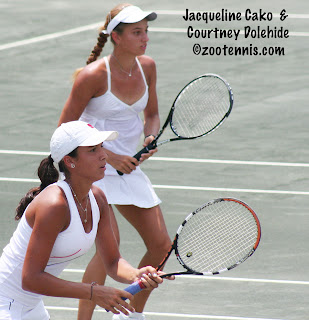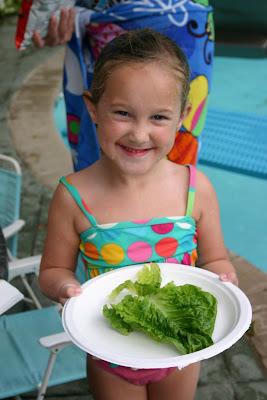
©Colette Lewis 2008--
Memphis, TN--
Beatrice Capra and Lauren Embree survived the steam bath atmosphere and determined opponents, setting up their first meeting Sunday with a USTA gold ball and a WTA qualifying wild card in next year's Celluar South Cup on the line.
The top seeded Capra fought off No. 4 seed Jacqueline Cako 6-3, 7-5, in the day's first match, with the third seeded Embree topping No. 5 Kristie Ahn by the same score.
Except for the final score and the match time (two hours) there wasn't much similarity between the two matches. Capra never trailed against Cako, taking an early 4-1, two-break lead in the first set by keeping her balls deep and taking advantage of more unforced errors than usual from Cako. Capra hit several lob winners, and other high top spin shots that reset the point, keeping Cako away from the net, where she ventures often, regardless of the surface.
"I thought I played really consistent," said the 16-year-old Capra, who beat Cako in the first round of last month's Grass Courts. "I picked out the target I wanted to hit on the court and thought I played pretty well. But I can't say that I had a plan going against her. I usually don't have a strategy when I go out, but luckily I was able to pull it together."
Capra had an early 4-1, one-break lead in the second set, but Cako, of Brier, Washington, won the next three games. With Capra serving at 4-4 30-all--an obviously crucial point--Cako's ball landed near the sideline. Capra called the all out and the chair umpire got down to check the mark and agreed with Capra's call, but Cako was not convinced. She made an error on the next point, but recovered her composure and held for for 5-5. Cako earned a break point in the next game, but Capra responded with a forehand winner and a serve winner for game point. Cako was at the net when Capra's cross court passing shot dipped by her. It landed just out, but Cako had touched it, and after a brief discussion, Capra had a 6-5 lead. Minutes later, she had the match, as Cako won only one point on her serve in the final game, sending a backhand wide to put Capra in the final.

Embree was down 2-0 in the opening set, but won six of the next seven games in spite of the ragged play exhibited by both girls. Ahn's forehand, which had been a key to her victory over Embree in March's Spring Nationals final, was more of a liability than an asset Saturday morning. But the 16-year-old Ahn recovered to take a 3-1 lead in the second set, and when Embree accidently hit her left knee with her racquet after swatting a ball in frustration, drawing blood, it looked as if Ahn would have an advantage over the remaining games. Embree didn't request a trainer, but bleeding requires treatment, and she was bandaged and taped. When play resumed, she cried out in pain and was treated again. Ahn held, taking a 4-1 lead, and when Embree served the next game, her pain, especially on the serve, was evident.
"When I first got it wrapped, she moved me from side to side, because she knew it was hurting me," said Embree "I think she tried to move me a little bit more than she had planned."
Ahn did earn a break point in that sixth game, but didn't convert. The New Jersey resident also failed to cash in on a set point serving at 5-4, hitting a backhand long, and Embree eventually won the game with a dropshot winner. Showing no further indication that her knee was bothering her, Embree broke Ahn in the next game, and survived two break points in the final game before finally cashing in on her second match point, when Ahn's forehand found the net.
A finalist at the 2007 Clays, Embree, of Marco Island, Fla., is eager to go one better on Sunday morning.
"I definitely want to win, because I don't want to have the same result as last year," said Embree. "And I want a gold ball."
Despite her success, Maryland's Capra, a bronze ball winner in Memphis last year, still ranks clay below hard and grass in surfaces she prefers. But as long as she can avoid the consolation tournament, she's content.
"Whenever I play these national tournaments, I really don't want to play the back draw--it's like torture," said Capra of the two-a-day matches the feed-in requires. "It's my incentive. Last year I got to the semis, and this year I really wanted to get to the finals, so I could prove to myself that I've gotten a step better."

The doubles champions were decided in the blistering 96 degree heat Saturday afternoon, with Cako and her partner Courtney Dolehide, of Hinsdale, Ill., earning their first gold balls with a grueling 7-6(5), 7-5 win over Floridians Alexandra Cercone and Jackie Kasler, the No. 6 seeds.
Cako and Dolehide, the No. 2 seeds, had their share of tough matches on their way to the championships, winning three three-setters, and it may have helped them survive the bouts of uneven play by both teams.
The first set featured as many breaks as holds, with advantages earned and then relinquished until the tiebreaker. There Cako and Dolehide took a 5-2 lead, saw it dwindle to 5-4, but held on to bank the first set.

In the second set, Cako had an opportunity to serve out the match at 5-4, but couldn't do it. Cako and Dolehide broke Kasler in the next game however, and with a second chance, Dolehide delivered the National Championship on her serve.
Having only played together previously at the Easter Bowl, Cako and Dolehide could sense that their games meshed.
"We saw the potential in our teamwork," said Dolehide, who is staying in the same private housing as Cako. "We had a couple of good matches, so we decided to play together at this tournament and at the Hard Courts."
In addition to winning USTA balls--the first of any kind for Cako, Dolehide has two silver--Cako and Dolehide were impressed with the trappings of the final.
"The ballpeople were great," said Dolehide, thankful that collecting balls wasn't necessary in the heat. "And it helps that there are people calling lines, so there's no controversy."
Cako voiced two keys to the victory, "staying aggressive and positive, and keep on pressing the net." Dolehide cited emotional support as the difference--"pumping each other up when we made errors, because both of us, our team and their team, were making errors, but we kind of fought through it."
For complete results, including consolation draws, see the
TennisLink site.
 About a month ago, Lainey went to visit her friend Grace's grandmother's house. We call her Nanu. Lainey was instantly in love with the house and especially the pool in the backyard. She immediately started planning a celebration to be had at Nanu's house. It would include a menu of lettuce, hamburgers and grilled cheeses for the kids.
About a month ago, Lainey went to visit her friend Grace's grandmother's house. We call her Nanu. Lainey was instantly in love with the house and especially the pool in the backyard. She immediately started planning a celebration to be had at Nanu's house. It would include a menu of lettuce, hamburgers and grilled cheeses for the kids.
 The top picture is Abby and Lainey. Just moments before Lainey had a complete meltdown because Abby got a float out of the water before she could get to it. I am glad the drama was over something so big.
The top picture is Abby and Lainey. Just moments before Lainey had a complete meltdown because Abby got a float out of the water before she could get to it. I am glad the drama was over something so big. Here are the moms! Don't we look excited to not be in the pool carting around all the children?
Here are the moms! Don't we look excited to not be in the pool carting around all the children? Thank you Nanu for being so kind to my daughter. She loved every second (minus the float incident) of the party. Thank you for opening your home for us to enjoy a swim, a delicious lunch and even better company. We love you.
Thank you Nanu for being so kind to my daughter. She loved every second (minus the float incident) of the party. Thank you for opening your home for us to enjoy a swim, a delicious lunch and even better company. We love you.




































